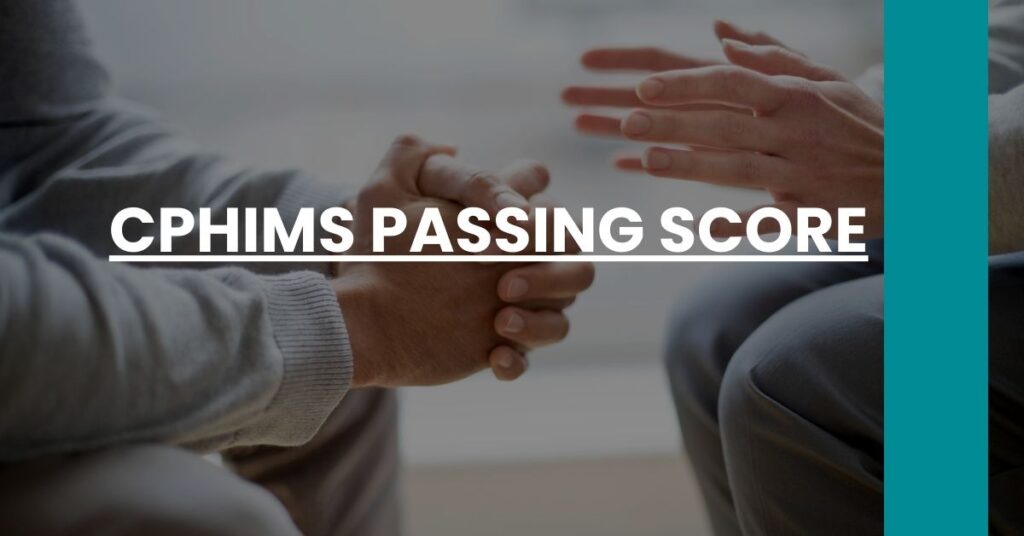The CPHIMS passing score is a minimum scaled score of 600 out of a possible 800 points. Achieving this score is a pivotal step for healthcare IT professionals aiming to validate their expertise and commitment to the field.
In this article, you will learn about:
- The exam structure and what knowledge areas are tested.
- Strategies to help you prepare and succeed in securing your CPHIMS certification.
Remember, hitting or surpassing the passing score opens doors for career advancement and professional growth. Let’s get you ready for success!
- Understanding the CPHIMS Certification
- Eligibility Criteria for the CPHIMS Exam
- Structure of the CPHIMS Exam
- What Constitutes a Passing Score on the CPHIMS Exam?
- Scoring Methodology for the CPHIMS Exam
- Preparing for the CPHIMS Exam
- Common Misconceptions About CPHIMS Passing Score
- Importance of the Passing Score for Healthcare IT Professionals
- Retaking the CPHIMS Exam: What You Need to Know
- Navigating the Certification Renewal and Continuing Education
- Conclusion: Your Path to Achieving the CPHIMS Passing Score
Understanding the CPHIMS Certification
The Certified Professional in Healthcare Information and Management Systems (CPHIMS) credential is your golden ticket to thriving in the complex and evolving landscape of healthcare IT. Obtaining this certification isn’t just a testament to your agility in navigating healthcare information systems; it’s a hallmark of excellence that can affirm your commitment to the field and set you apart from your peers.
When you think about CPHIMS, it’s crucial to recognize that it’s more than just an acronym; it’s a career-defining milestone that showcases your knowledge, skillset, and dedication to upholding industry standards. Whether you’re a seasoned IT professional pivoting into healthcare, or a healthcare veteran keen on leveraging technology, the CPHIMS certification can be your leverage for better opportunities.
And that brings us to the CPHIMS passing score—the numerical threshold that stands between you and this coveted credential. Akin to a gatekeeper, this score is critical because it quantifies your competency and preparedness to lead in the health IT realm. Like any milestone worth pursuing, understanding what this score entails is your strategic advantage.
Eligibility Criteria for the CPHIMS Exam
Before you can conquer the infamous CPHIMS passing score, you must ensure that you’re eligible to step onto the battlefield. The criteria set forth by HIMSS, the governing body of the CPHIMS certification, are designed to ascertain that only professionals with the rigorous experience and educational foundation needed to master the complexities of healthcare IT can take the exam.
A glance at the eligibility prerequisites reveals that you’ll need to arm yourself with a baccalaureate degree coupled with substantial real-world experience in healthcare information and management systems. This dual requirement aligns you with the standards expected from leaders in the field, and it emphasizes the significance of understanding the CPHIMS passing score—because it is reserved for those who’ve met the baseline of professional readiness.
To dot all your i’s and cross your t’s, ensure to review the official eligibility criteria. This can’t be overstated, as you wouldn’t want any last-minute surprises about your qualifying status to derail your certification journey.
Structure of the CPHIMS Exam
Delving deeper into the structure of the CPHIMS exam, you’re looking at a formidable 100 multiple-choice questions that cover a sprawling canvas of knowledge areas crucial to your role as a healthcare IT professional. These questions are strategically distributed across a set of domains, each pertaining to a core competency required in the industry.
With a blend of recall, application, and analytical question types, the exam is designed to challenge and verify your expertise in the most comprehensive way. It’s a test of not only your ability to remember critical information but also to apply it effectively in practical scenarios.
The structure becomes even more relevant when we talk about the CPHIMS passing score. Since the exam is a measuring stick, the breadth and depth of its scope directly impact the benchmark for passing—it’s tailored to test the full spectrum of competencies expected from a certified professional.
What Constitutes a Passing Score on the CPHIMS Exam?
Now to the crux of your quest: defining the CPHIMS passing score. As of the latest examination guidelines, a minimum scaled score of 600 is what you’ll need to hit on a scale that spans from 200—essentially zero—to 800—the perfect score. Securing this passing score is like unlocking the door to the elite club of CPHIMS-certified professionals.
This scaled score is not just a number. It represents a standardization that accounts for variations in exam difficulty and ensures a consistent benchmark for all test-takers. Earning a 600 or above is the validation that you, as a professional, have grasped the intricate nuances of healthcare information and management systems and are ready to make an impact in the field.
Keep in mind, the journey towards achieving the CPHIMS passing score is one of persistence and determination. It requires a methodical approach to learning and a clear understanding of both the material and the test itself.
Scoring Methodology for the CPHIMS Exam
You might be curious about the nuts and bolts of how the CPHIMS exam is scored. The scoring process involves converting your raw score—the number of questions you answered correctly—into this standardized scaled score. This normalization process ensures that your score is reflective of your performance and not unduly influenced by the difficulty level of the specific set of questions in your exam.
Upon completion of the exam, you’re not left in suspense for long; you will promptly receive a report detailing your score and whether or not you’ve achieved that crucial 600 point mark. Though complex behind the scenes, the reporting is straightforward, offering you a clear indication of your accomplishment.
Understanding the scoring methodology brings a new depth to appreciating the CPHIMS passing score. It isn’t merely about accuracy—it’s about measured competency in a constantly shifting and challenging field. Every question correctly answered on the exam is a step towards demonstrating your readiness to take on the responsibilities and innovations that characterize today’s healthcare IT landscape.
You can find an in-depth explanation of the scoring process and further guidance on interpreting your scores in the CPHIMS Candidate Handbook, a valuable resource as you prepare to showcase your expertise and join the ranks of credentialed professionals.
Preparing for the CPHIMS Exam
Preparing for the CPHIMS exam can be a daunting venture. However, with an intentional strategy, you can navigate this journey with confidence. For starters, it’s vital to familiarize yourself with all four categories of the exam: general healthcare and technology environments, systems analysis, design and selection, and implementation and support.
A sound approach would be to study each domain thoroughly, using a mix of textbooks, online courses, and revision from authoritative sources like the HIMSS CPHIMS Review Courses. Consider setting aside dedicated study times each week, focusing on different domains to keep your study efforts varied and engaging.
Key Strategies to Empower Your Study Sessions:
- Create a study plan that includes dedicating specific days to specific domains.
- Join study groups or online forums for collaborative learning and moral support.
- Take practice exams to identify areas where you need more focus.
- Reflect on incorrect answers to understand your mistakes and correct your thinking.
- Stay updated by reading current literature in the field to ensure your knowledge is contemporary and relevant.
Investing your time wisely in your preparation is a critical investment towards achieving that CPHIMS passing score. Remember, the energy you dedicate to preparation will pay off on exam day and in your future career.
Common Misconceptions About CPHIMS Passing Score
As you prepare, be wary of common misconceptions surrounding the CPHIMS exam—especially around the passing score. A prevalent fallacy is that the CPHIMS passing score represents a percentage. To clarify, it is not a percentage but a standard scaled score, which reflects your proficiency relative to the benchmark set for the credential.
It’s also important to understand that the passing score of 600 isn’t constant across all iterations of the exam. Different versions of the test may have slight variations in difficulty, and the scaled score accounts for these differences to ensure fairness. Keep this in mind as you review, and focus on mastering the material rather than merely aiming for a percentage.
Untangling these misconceptions early on ensures you’re heading into your exam with accurate expectations and a focus on what truly matters—demonstrating your adeptness in healthcare IT.
Importance of the Passing Score for Healthcare IT Professionals
Achieving the CPHIMS passing score isn’t just about accreditation; it’s a catalyst that can spur various advancements in your professional journey. A CPHIMS certification confirms to employers that you possess a broad and deep understanding of healthcare information systems, setting you up as a strong candidate in an increasingly competitive field.
Moreover, becoming certified might lead to new career paths, leadership roles, and the respect of your peers. It is an acknowledgment of your dedication to continuous improvement and alignment with best practices in healthcare technology. This can translate into trust from colleagues, stakeholders, and patients alike.
Your pursuit of the CPHIMS passing score is more than a professional hurdle; it’s an opportunity to solidify your credibility in a field that is at the heart of modern healthcare delivery.
Retaking the CPHIMS Exam: What You Need to Know
If you find yourself falling short of the CPHIMS passing score on your first try, don’t be disheartened. Instead, treat it as a valuable learning experience. The retake policy permits you to sit for the exam again after a 90-day waiting period, offering you ample time to bolster your understanding and refine your study approach.
Before your next attempt, conduct a thorough review of the CPHIMS Candidate Handbook for updated guidelines and exam practices. Reflect on the exam questions that were challenging and seek out additional resources or mentors to shore up your skills in those areas.
Remember, persistence is key. You now have a clearer understanding of the exam’s landscape and can thus prepare with a targeted strategy to elevate your score beyond the passing mark.
Navigating the Certification Renewal and Continuing Education
Passing the CPHIMS exam and obtaining your certification is a beginning, not an end. To maintain your CPHIMS status, you are required to accumulate a minimum of 45 Continuing Education (CE) hours every three years. This ensures you stay at the forefront of healthcare IT advancements and continue to grow in your expertise.
This lifelong learning commitment parallels the fast-paced advancements in the industry, so be proactive in seeking out educational opportunities, conferences, webinars, and professional development courses that can contribute to your CE hours. Refer to the certification renewal guidelines to stay informed of upcoming deadlines and requirements.
Embracing continuous education is how you will not only retain your CPHIMS credential but, more importantly, provide the highest quality service in your healthcare IT role.
Conclusion: Your Path to Achieving the CPHIMS Passing Score
You now possess a deeper insight into the nuances of the CPHIMS exam—from learning about the structure and scoring methodology to discovering effective preparation strategies and the importance of the CPHIMS passing score in your professional life. Armed with this knowledge and a robust preparation plan, you’re well-positioned to approach the CPHIMS certification with confidence and purpose.
Remember, achieving the CPHIMS passing score is not just an academic milestone; it’s a beacon that illuminates your dedication, expertise, and commitment to staying at the vanguard of healthcare IT. We hope this article has fortified your resolve and equipped you with the tools to embark on this quest. Now, it’s time to take the reins on your journey to CPHIMS certification success!
CPHIMS passing score criteria detailed. Learn what’s needed to ace the healthcare information management systems certification exam.

